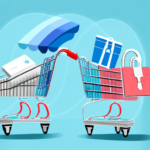Enhance Your Website's Security Measures
In the digital era, safeguarding your ecommerce website against cyber threats is crucial. With cybercrime projected to cost businesses over $10.5 trillion annually by 2025 (Cybersecurity Ventures), implementing robust security measures is essential to protect both your business and your customers.
Best Practices for Securing Your Ecommerce Website
To fortify your ecommerce platform, consider the following best practices:
- SSL Encryption: Ensure all data transmitted between your website and users is encrypted using Secure Sockets Layer (SSL) certificates.
- Strong Password Policies: Implement complex password requirements and encourage the use of password managers.
- Two-Factor Authentication (2FA): Add an extra layer of security by requiring a second form of verification during login.
- Regular Software Updates: Keep your website's software, plugins, and extensions up-to-date to patch vulnerabilities.
Protecting Your Customers' Data: A Top Priority
Maintaining customer trust hinges on your ability to protect their personal information. According to a survey by PwC, 85% of consumers are concerned about data privacy. Implementing stringent data protection measures not only ensures compliance with regulations like the GDPR but also builds long-term customer loyalty.
Regularly Monitor Your Website for Suspicious Activity
Continuous monitoring is vital to identify and mitigate potential security threats promptly. Utilize tools such as Sucuri or Datadog to track website traffic patterns, detect anomalies, and receive real-time alerts about unauthorized changes or malicious activities.
Simplify the Customer Experience
During the festive season, shoppers seek convenience and efficiency. Enhancing the customer experience can significantly boost sales and customer satisfaction.
Streamlining the Checkout Process
A complicated checkout process can lead to cart abandonment. Simplify it by reducing the number of steps required to complete a purchase. Implement features like guest checkout, auto-fill forms, and multiple payment options such as PayPal and Apple Pay.
Providing Clear Navigation and Search Functionality
Ensure your website's navigation is intuitive. Organize products into well-defined categories, incorporate a responsive search bar with autocomplete suggestions, and utilize filters to help customers find products quickly. According to Nielsen Norman Group, clear navigation significantly enhances user experience.
Offering Personalized Recommendations
Personalization can drive higher engagement and sales. Use customer data to suggest products based on browsing history and previous purchases. Tools like Salesforce Commerce Cloud offer advanced personalization features that can tailor the shopping experience to individual preferences.
Providing Excellent Customer Support
Responsive customer support can differentiate your business during peak seasons. Implement live chat options, ensure timely responses to inquiries, and maintain comprehensive product information to assist customers in making informed decisions.
Creating a Personalized Shopping Journey
Personalization enhances the shopping experience by making it more relevant to each customer. Leveraging customer data effectively can lead to increased sales and customer loyalty.
Utilizing Customer Data to Tailor the Experience
Analyze customer behavior and preferences to offer tailored experiences. This includes personalized email campaigns, targeted advertisements, and customized product recommendations. According to a study by Business Insider, personalization can deliver five to eight times the ROI on marketing expenditures.
Implementing Product Recommendations and Personalized Offers
Use algorithms to recommend products that complement previous purchases or browsing history. Personalized discounts and offers can incentivize repeat purchases and enhance customer satisfaction.
The Importance of Transparency and Consent
While personalization is beneficial, it's essential to maintain transparency about data usage. Ensure compliance with data protection regulations by obtaining explicit consent from customers and providing options to opt-out of data collection. Transparency fosters trust and long-term customer relationships.
Boost Sales with Strategic Promotions
Effective promotions can drive significant sales during the festive season. Crafting the right promotions and utilizing appropriate channels can maximize their impact.
Crafting Effective Promotions That Drive Conversions
Design promotions that resonate with your target audience. Whether it's discounts, buy-one-get-one offers, or limited-time deals, ensure they are clear and compelling. Use urgency tactics, such as countdown timers, to encourage immediate action.
Leveraging Social Media for Promotional Campaigns
Social media platforms like Facebook and Twitter offer robust advertising tools to reach a wider audience. Create holiday-themed content, engage with followers, and utilize sponsored posts to enhance visibility.
Creating a Sense of Exclusivity
Exclusive offers can make customers feel valued. Consider providing special deals to loyal customers, newsletter subscribers, or those who have made multiple purchases. This approach not only boosts sales but also fosters customer loyalty.
Measuring the Success of Your Promotions
Analyze the effectiveness of your promotional campaigns using tools like Google Analytics. Track metrics such as conversion rates, website traffic, and sales growth to determine ROI and inform future strategies.
Optimizing Ecommerce Fulfillment Operations
Efficient fulfillment operations are critical to customer satisfaction, especially during high-demand periods like the festive season. Streamlining these processes ensures timely deliveries and maintains product quality.
Maximizing Efficiency and Speed in Order Fulfillment
Implement automation tools to expedite order processing. Solutions like ShipStation and ShipBob can automate shipping label creation, inventory tracking, and order management, reducing manual errors and increasing speed.
Managing Inventory and Shipping Logistics
Accurate inventory management prevents stockouts and overstock situations. Utilize inventory forecasting tools to predict demand and adjust stock levels accordingly. Partnering with reliable shipping providers ensures timely and safe deliveries.
Implementing Quality Control Measures
Maintain high product standards by instituting quality control checks before shipping. Use protective packaging materials and provide clear handling instructions to minimize damage during transit.
Providing Excellent Customer Service
Outstanding customer service complements efficient fulfillment. Offer order tracking, prompt responses to inquiries, and hassle-free return policies to enhance the overall customer experience.
Conclusion: Elevating Your Ecommerce Strategy for Success
Preparing your small business for the festive season involves a multifaceted approach encompassing website security, customer experience, personalization, strategic promotions, and optimized fulfillment operations. By implementing these strategies, you can position your business for a successful and profitable holiday period.
Moreover, these practices contribute to sustained ecommerce success beyond the festive season. Continuously refining your strategies, staying abreast of industry trends, and prioritizing customer feedback will ensure long-term growth and competitiveness in the ever-evolving market.
Investing in these areas not only drives immediate sales but also builds a strong foundation for enduring customer relationships and business resilience.






















